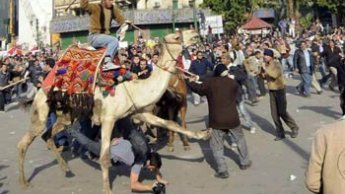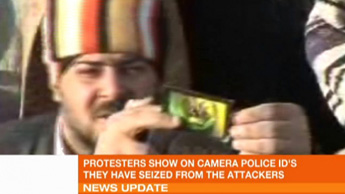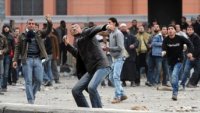News, February 2011
www.aljazeerah.info
Archives
Mission & Name
Conflict Terminology
Editorials
Gaza Holocaust
Gulf War
Isdood
Islam
News
News Photos
Opinion Editorials
US Foreign Policy (Dr. El-Najjar's Articles)
|
Editorial Note: The following news reports are summaries from original sources. They may also include corrections of Arabic names and political terminology. Comments are in parentheses. |
Enter the Baltagiya:
How Mubarak's
Security Forces Intimidated Opposition for Decades by Using
Hired Thugs
February 9, 2011

Enter the 'baltagiya': Egypt's repression spills out of the torture chambers
France 24, February 9, 2011
For decades, Egyptian and international human rights groups have been publishing reports of extensive torture in the world’s largest Arab nation. Grim, gruesome, and graphic, they do not make pleasant reading.
The reports of torture were so extensive and commonplace that apart from human rights circles, little international attention was paid to these disturbing chronicles.
On February 2 - or Day Nine of the Egyptian uprising – all that suddenly changed.
As protesters demanding President Hosni Mubarak’s resignation clashed with "baltagiya" - or hired thugs paid by the regime - the dark side of Egypt was put on public display.
Under the international spotlight, the brutal repression of a 30-year-old regime appeared to spill from the secrecy of the torture chambers onto the streets of the Egyptian capital.
“This is the result of years of ignoring torture, of failing to prosecute it and thereby deterring it,” said Heba Morayef, a researcher with Human Rights Watch in Cairo. “It has created a culture of impunity and this is coming out into the streets.”
A baroque blowback of an Arab Revolt gone wrong
As the world watched pro-and anti-Mubarak
demonstrators battle it out on Cairo’s Tahrir Square,
international news organizations scrambled to make sense of the
seemingly senseless carnage.
First came the bizarre spectacle of regime supporters riding into Tahrir Square on horses and camels in what seemed like a baroque blowback to a T.E. Lawrence-era Arab Revolt gone wrong.
Then Arabic satellite stations such as Al Jazeera and Al Arabiya began broadcasting images of anti-Mubarak demonstrators holding aloft what looked like identity cards.
“Protesters show on camera police ID’s they have seized from the attackers,” read an Al Jazeera caption under one image.
But Egyptian officials vehemently denied that plainclothes police had joined the ranks of pro-regime demonstrators forcing international news organisations to characterise the reports as “opposition claims”.
Outsourcing coercion: Send in the ‘baltagiya’
Ordinary Egyptians had no such qualms about
identifying the latest display face of savagery.
“Baltagiya,” was the one-word explanation used by many Egyptians – including those who preferred to give the regime a second chance so they could get back to normal life.
An all-encompassing word that literally means “thugs” or “gangs” in Egyptian Arabic, “baltagiya,” according to Issandr El Amrani, a Cairo-based political analyst and writer, “might be gangs, police informants, or unemployed youths that can be hired, or just poor people who are paid off.”
Within the Egyptian security apparatus the “baltagiya” have been extensively employed especially by the Interior Ministry’s infamous SSI (State Security Investigations).
In its latest report, “Work on Him Until He Confesses,” the New York-based Human Rights Watch has singled out SSI officials for using “torture and ill-treatment on a widespread, deliberate and systematic basis over the past two decades to glean confessions and information, or to punish detainees.”
According to Human Rights Watch's Heba Morayef, the power of the SSI has been increasing in recent years. “They monitor political parties, civil society groups, anything political becomes an issue. Demonstrations are viewed as illegal and illegitimate and protesters can be detained under the emergency laws,” she explained referring to the widely criticized legislation that has been in place since the 1981 assassination of then President Anwar Sadat.
Over the last two decades of Mubarak’s reign, the “baltagiya” have been accused of violently breaking up demonstrations and using sexualized brutality such as groping and harassment to deter protesters.
“This is not a new thing, it has been going on for ages,” said El Amrani. “We saw the"baltagiya" being used as a matter of routine during the November (2010 parliamentary) elections. The ruling NDP (National Democratic Party) used the "baltagiya" for vote rigging and other activities, [while] big businessmen use them for intimidation and racketeering. It’s widespread.”
Public anger over the endemic corruption, torture and savagery within the police forces played a major role in sparking the latest, unprecedented uprising in Egypt.
The face of the Egyptian uprising: ‘We are all Khaled Said’
The current protests broke out on January 25, a public holiday marking National Police Day.
The timing, according to Morayef, was not coincidental. “The demonstrations were planned and arranged for Police Day because of the public anger over the killing of Khaled Said,” she noted.
A 28-year resident of the Mediterranean coast city of Alexandria, Said was pulled out of an Internet café in July 2010 by two plainclothes policemen and bludgeoned to death at the entrance of the residential building, according to several witnesses.
Opposition groups say Said was targeted for posting a video on the Internet of police officers sharing the spoils from a drug bust. While the report has not been confirmed, it seemed plausible for a populace that has long suspected police of running drug and protection rackets with local gangs.
A Facebook page titled “We are all Khaled Said” soon appeared on the social networking site complete with mobile phone photographs of Said’s battered corpse in the morgue. The anonymous administrator, who used the pseudonym “al shaheed” ("the martyr") was later revealed to be Google executive Wael Ghonim, who has since turned into a hero of the movement.
But even before Ghonim’s revelation, “We are all Khaled Said” was a sizeable dissident site and when it joined other protest movements in calling for protests on National Police Day, even the organizers were surprised by the turnout.
Lifting the lid on a ‘brutalized society’
But they were not altogether surprised by what happened in the next few days. In a London Review of Books column, El Amrani notes that on January 28, Egypt’s powerful former Interior Minister Habib al-Adly “decided to withdraw all police from the centre of Cairo and let loose 'the baltagiya'…with orders to loot and cause mayhem.”
As Egyptian state television channels unleashed a propaganda offensive accusing opposition supporters and foreigners of “muamara” – or “conspiracy” – against the nation, the stage was set for the brutal crackdown of Feb.2.
“Given the organized nature of the attacks by thugs (on opposition protesters), they were very likely organized and carried out by people hired to do the job,” said Morayef.
“The organized nature became even more apparent when the attacks stopped once the Prime Minister (Ahmed Shafik) promised to investigate the incidents and punish those responsible.”
In a country where most torturers and thugs go unpunished few expect the perpetrators of the February 2 clashes to face justice. And that, according to some analysts, is a long term issue confronting Egyptian society.
“This is still a brutalized society,” said El Amrani. “Cairo for outsiders seemed like a safe place because society was heavily repressed. But when the lid of repression is lifted, the brutal outcome is an outburst of violence.”

Fair Use Notice
This site contains copyrighted material the use of which has not always been specifically authorized by the copyright owner. We are making such material available in our efforts to advance understanding of environmental, political, human rights, economic, democracy, scientific, and social justice issues, etc. We believe this constitutes a 'fair use' of any such copyrighted material as provided for in section 107 of the US Copyright Law. In accordance with Title 17 U.S.C. Section 107, the material on this site is distributed without profit to those who have expressed a prior interest in receiving the included information for research and educational purposes. For more information go to: http://www.law.cornell.edu/uscode/17/107.shtml. If you wish to use copyrighted material from this site for purposes of your own that go beyond 'fair use', you must obtain permission from the copyright owner.
|
|
|
|
||
|
||||||






